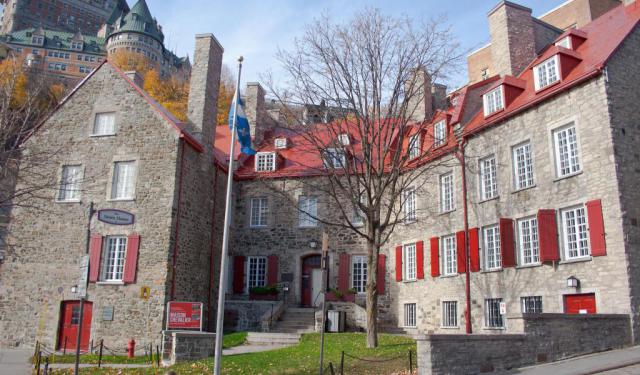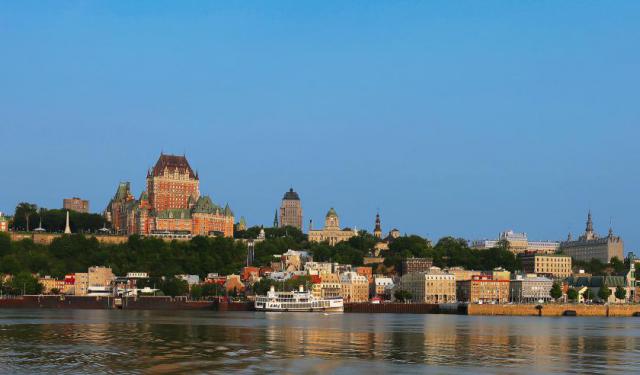
Museum of Civilization (Musee de la Civilisation), Quebec City (must see)
The Museum of Civilization is found in the heart of Quebec City's port district, not far from the shores of the Saint Lawrence River. Inaugurated in 1988, the museum explores the history (much as the present and the future) of human civilization and that of Quebec, in particular.
Architecturally, the venue comprises several historic buildings, such as the former Bank of Quebec edifice, the Guillaume-Estèbe house (Maison Guillaume-Estèbe) – now home to the museum shop and administration, and the vaulted cellars of the Pagé-Quercy house. Albeit generally in line with the traditional style of this part of the city, the museum's main building's modern exterior – the roof, the windows, and the bell tower – strikingly contrasts the neighboring architecture.
Designed by Moshe Safdie, the mastermind behind Montreal's revolutionary Habitat 67, the museum's front entry is tucked away into an incline, which gives it a bit of a natural touch, with a glass roof and greenery sprouting along the sides. Once inside, you will find yourself in a well-lit spacious lobby, clad in glass and dominated by Astri Reusch's "La Débâcle" sculpture. This environmental piece is said to be inspired by the springtime accumulation of ice in the Saint Lawrence river.
The three-story building accommodates ten different exhibits simultaneously, three of which are permanent and rooted in the region's history. The one called “The Time of Quebecers” (“Le Temps des Québécois”) is a summary of significant events that have shaped modern Quebec, from the days of the first nations and Inuit culture to the present.
Located in the basement are the so-called “discovery spaces”, interactive activity sites intended mainly for the young audience. Here, the exhibit called “Once upon a time” allows children to dress up as their favorite characters and recreate tales in an interactive environment, while the on-site Creaform lab introduces visitors to the issues of the digital world such as robotics, basic programming, and electrical circuits.
Vast on the inside, the museum is capable of holding hundreds of people at a time, so you'll never feel cramped. There's something for everyone, regardless of age and specific interests. Many exhibits offer "hands-on" experience. Although both English and French tours are available, visitors are free to walk through and explore on their own.
Tip:
If you arrive at 4 pm for the last hour, you can get in at a half price, but note: to see the core exhibits, you should allow yourself at least three hours. Alternatively, you can get a discount if you visit this museum and the National Museum of Fine Arts (Musée National des Beaux-Arts) on the same day.
Architecturally, the venue comprises several historic buildings, such as the former Bank of Quebec edifice, the Guillaume-Estèbe house (Maison Guillaume-Estèbe) – now home to the museum shop and administration, and the vaulted cellars of the Pagé-Quercy house. Albeit generally in line with the traditional style of this part of the city, the museum's main building's modern exterior – the roof, the windows, and the bell tower – strikingly contrasts the neighboring architecture.
Designed by Moshe Safdie, the mastermind behind Montreal's revolutionary Habitat 67, the museum's front entry is tucked away into an incline, which gives it a bit of a natural touch, with a glass roof and greenery sprouting along the sides. Once inside, you will find yourself in a well-lit spacious lobby, clad in glass and dominated by Astri Reusch's "La Débâcle" sculpture. This environmental piece is said to be inspired by the springtime accumulation of ice in the Saint Lawrence river.
The three-story building accommodates ten different exhibits simultaneously, three of which are permanent and rooted in the region's history. The one called “The Time of Quebecers” (“Le Temps des Québécois”) is a summary of significant events that have shaped modern Quebec, from the days of the first nations and Inuit culture to the present.
Located in the basement are the so-called “discovery spaces”, interactive activity sites intended mainly for the young audience. Here, the exhibit called “Once upon a time” allows children to dress up as their favorite characters and recreate tales in an interactive environment, while the on-site Creaform lab introduces visitors to the issues of the digital world such as robotics, basic programming, and electrical circuits.
Vast on the inside, the museum is capable of holding hundreds of people at a time, so you'll never feel cramped. There's something for everyone, regardless of age and specific interests. Many exhibits offer "hands-on" experience. Although both English and French tours are available, visitors are free to walk through and explore on their own.
Tip:
If you arrive at 4 pm for the last hour, you can get in at a half price, but note: to see the core exhibits, you should allow yourself at least three hours. Alternatively, you can get a discount if you visit this museum and the National Museum of Fine Arts (Musée National des Beaux-Arts) on the same day.
Want to visit this sight? Check out these Self-Guided Walking Tours in Quebec City. Alternatively, you can download the mobile app "GPSmyCity: Walks in 1K+ Cities" from Apple App Store or Google Play Store. The app turns your mobile device to a personal tour guide and it works offline, so no data plan is needed when traveling abroad.
Museum of Civilization (Musee de la Civilisation) on Map
Sight Name: Museum of Civilization (Musee de la Civilisation)
Sight Location: Quebec City, Canada (See walking tours in Quebec City)
Sight Type: Museum/Gallery
Guide(s) Containing This Sight:
Sight Location: Quebec City, Canada (See walking tours in Quebec City)
Sight Type: Museum/Gallery
Guide(s) Containing This Sight:
Walking Tours in Quebec City, Quebec
Create Your Own Walk in Quebec City
Creating your own self-guided walk in Quebec City is easy and fun. Choose the city attractions that you want to see and a walk route map will be created just for you. You can even set your hotel as the start point of the walk.
Old Quebec Walk
The historic part of Quebec City known as Old Quebec (French: Vieux-Québec), sometimes also referred to as the Latin Quarter (Quartier Latin), is the neighborhood centered around Cape Diamond (Cap Diamant), located on the eastern edge of Quebec hill promontory. The area comprises Upper Town (Haute-Ville) and Lower Town (Basse-Ville) and is currently listed among UNESCO’s World Heritage Sites.
... view more
Tour Duration: 2 Hour(s)
Travel Distance: 2.6 Km or 1.6 Miles
... view more
Tour Duration: 2 Hour(s)
Travel Distance: 2.6 Km or 1.6 Miles
Qucbec City's Historical Churches Walking Tour
The first religious buildings in Canada were established by the Récollets and Jesuits, in 1615 and 1625, respectively, when they first arrived in New France. Later on, the French colonists brought along their culture and architectural traditions, and the establishment of British and evangelical society triggered further major developments in Quebec City.
Over the course of the 17th and 18th... view more
Tour Duration: 2 Hour(s)
Travel Distance: 2.9 Km or 1.8 Miles
Over the course of the 17th and 18th... view more
Tour Duration: 2 Hour(s)
Travel Distance: 2.9 Km or 1.8 Miles
Historical Houses Walking Tour
Quebec City, particularly evocative of Europe in its atmosphere, is often referred to as the cradle of New France. The city boasts one of the richest architectural heritages in North America, though most of its buildings had to be adapted to harsh winters and the lack of specialized workers and materials in the colony. As such, the majority of local houses were designed as simple and efficient... view more
Tour Duration: 2 Hour(s)
Travel Distance: 2.5 Km or 1.6 Miles
Tour Duration: 2 Hour(s)
Travel Distance: 2.5 Km or 1.6 Miles
Quebec City Introduction Walking Tour
Cresting a cliff above the St. Lawrence River, Québec City (French: Ville de Québec) is the soul of the province of Québec – a place all its own; a country within a country with its own traditions, architecture, and French-speaking population.
The Algonquian people had originally named the area Kébec, which means "where the river narrows", because the Saint Lawrence River... view more
Tour Duration: 2 Hour(s)
Travel Distance: 3.2 Km or 2 Miles
The Algonquian people had originally named the area Kébec, which means "where the river narrows", because the Saint Lawrence River... view more
Tour Duration: 2 Hour(s)
Travel Distance: 3.2 Km or 2 Miles




